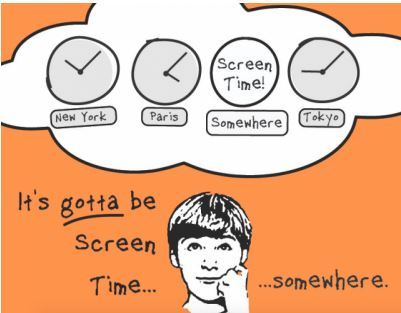
My boys always want it to be screen time. I don't think that is changing anytime soon. These apps, shows, games and devices are only getting smarter at capturing their attention. It seems to me, parents (all of us) are looking for a couple of things in the content we read about parenting with screens: permission and hacks for simplicity. This post will perhaps offer neither. Until the end.
Most of us acknowledge that not all screens are the same, nor is all programming, nor are the stages of life where apps and screens are enjoyed (infants versus an 8-year-old). "Screen time" is an issue layered with complexity. Parenting during this explosive device development era demands simple rules and dictums for limiting their use.
No one follows the rules like religion. Parents, grandparents and caregivers aren't devout to recommendations because we claim the rules just don't fit into the context of our lives. Most of us figure out a way to make justifiable exceptions. It's simply too easy to pull out your phone, especially when it delights your child the way it does, and entertain. But no question that with the rules out there stressing non-use and limits, we're left feeling a little guilty anytime we left our children indulge.
A Couple Observations About Screen Time
- We don't have robust data that screens benefit babies or help prepare them for a better or happier life. This is true even for apps advertised for learning and for interactive ones. It's easy to criticize passive media viewing (aka plopping your baby in front of the TV while you prep dinner) but less is known about interactive content. There is however, data that human interaction, bonding, early reading from birth, and interactive play do help babies thrive. So as evidence suggests, TV viewing and an electronic babysitter earlier in life may change executive function, the way a child expects the pace of life to move, and their skills in interaction. Many parents are looking for permission here -- to have their infants watch TV, hold the iPhone, play with apps, and view videos. Most parents also smartly want a guide, an acceptable amount of time for babies and screens. There just isn't yet a scientific response to the ask. Bottom line: strictly limiting media, even interactive media, for babies is still a must in my opinion.
Here's my quick tips about regulation: Children Can Regulate Screen Time, Let Them Practice
- Get the screens out of the bedroom for all children and teens as we know screens interfere and detract from sleep. Smaller screens have worse effects on sleep. Have devices sleep in common area or kitchen. This should be for everyone at home. Read: Sleeping With A Smartphone.
No question, this is gonna take practice. No reason not to start now.
Follow Wendy Sue Swanson, MD, MBE, FAAP on Twitter:
www.twitter.com/SeattleMamaDoc
